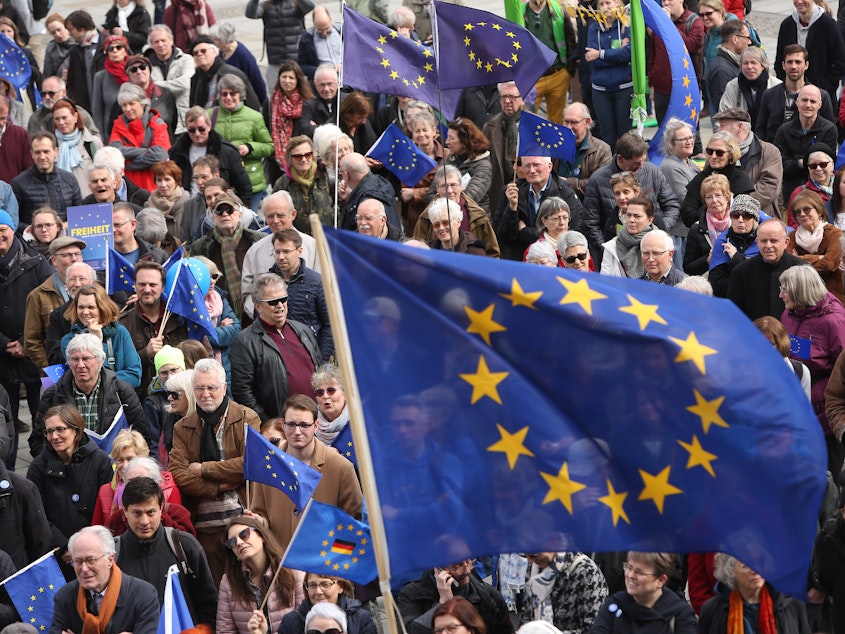Here's Why Brexit Wasn't Followed By Frexit, Swexit Or Nexit

When the United Kingdom voted for Brexit nearly three years ago, some thought it might mark the beginning of the end of the European Union. Some analysts warned the U.K. would be the first in a series of dominoes to fall and spoke of a possible "Frexit," "Nexit" and "Swexit."
But instead of becoming a harbinger of the EU's demise, the United Kingdom descended into political chaos and became a cautionary tale for other EU countries.
Isabell Hoffmann, who tracks opinion in the EU for Bertelsmann Stiftung, a German independent foundation, says Brexit hasn't hurt the EU's standing — it's helped it.
"We do see a Brexit effect in the numbers when it comes to support for the European Union," says Hoffmann. "Actually, they go up in a significant manner, and they stay up ever since." That support is up by 10 percentage points since the 2016 referendum, she says. "There are now roughly 70 percent of people who'd say 'we would vote for our country to stay in the European Union.' "
Other polls show similarly high levels of approval for the Brussels-based political union and trading bloc of 28 nations. Observers say more people are rallying to support the European Union these days because it's under siege.
Sponsored
Many Europeans are also wary because the Brexit process — far from being smooth and successful as Brexiteers had promised — has been a disaster. Prime Minister Theresa May and the British Parliament have been trapped in a policy maze for months, with no consensus on how to leave the EU. Britain's House of Commons, known for its boisterous but often erudite and coherent debate, has been marked by shouting matches and vitriol.
George Papaconstantinou, who served as Greece's finance minister from 2009 to 2011, says much of Europe has watched Brexit play out with disbelief and astonishment.
"A country which prides itself as having an extremely robust parliamentary system suddenly finds itself completely adrift," says Papaconstantinou.
The political disarray in London has made leaving the EU a hard sell on the continent. "The whole process of Brexit being so complicated, so difficult — that made people realize that you don't leave the EU so easily," Papaconstantinou says. Eurosceptic parties in France, the Netherlands and Sweden have since backed off calls for similar referenda and focused instead on changing the EU from within.
In the last decade, the EU has been rocked by immigration and debt crises. In the wake of the 2008 global financial crisis, a number of countries, including Greece, Portugal, Ireland, Spain and Cyprus, weren't able to repay or refinance their government debt. The financial meltdown threatened the European banking system. In 2015, more than a million migrants and asylum seekers from Africa and the Middle East traveled to Europe, putting pressure on public resources, fueling populism and helping to tip the Brexit referendum to leave.
Sponsored
Papaconstantinou says support for the EU has risen not just because people fear the chaos that a divorce like Brexit would bring, but also because more Europeans seem to appreciate the EU and see "a common destiny in a way that they didn't five years ago."
But the European Union's problems are far from over. Economic growth is slowing. The population continues to age. And EU critics are gaining more political power.
Even as Brexit has provided some breathing space, populism is a bigger challenge today than it was in 2016. Populists are in charge in Italy, the third-largest economy in the eurozone, and populist parties in Sweden, Spain, Germany, Austria and Estonia have made breakthroughs.
"I think you can make a convincing case for why the challenges to the EU have gained momentum," said Matthew Goodwin, co-author of National Populism: The Revolt Against Liberal Democracy.
Goodwin says the EU has the upper hand now and the Brexit mess has strengthened it. But the long-term success of the European Union is far from certain. [Copyright 2019 NPR]
